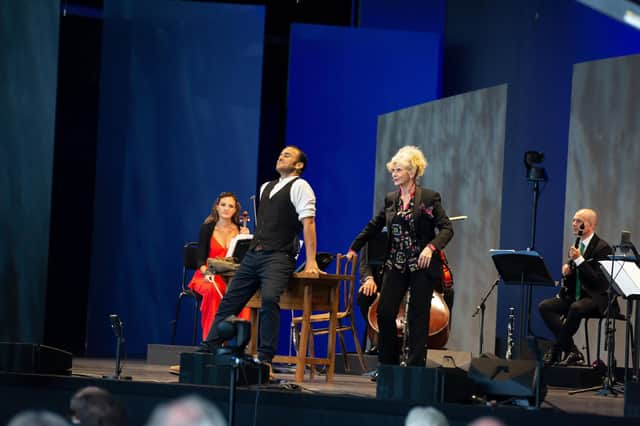EIF reviews: A Soldier's Tale | Gerald Finley and Julius Drake | Joyce DiDonato - Il Pomo d’Oro | Ariadne Auf Naxos


It happened big time last weekend, but in a way, you might argue, that intensified the devilish antics of Stravinsky’s The Soldier’s Tale (****), which violinist Nicola Benedetti player-directed as the culmination of her week-long residency. It’s that old Faustian yarn about the devil taking the soul (the fiddle) of a naive mortal (the Soldier) under false pretences, for it all to end in despair.
The stage element was practical and economic. Yes, it would have been more complete with dancers to add pungency to Stravinsky’s grotesque parodies, but with Sir Thomas Allen narrating (and responsible for the straightforward stage presentation), Anthony Flaum as the hoodwinked Soldier, and the versatile Siobhan Redmond as the multifaceted Devil, the tale was tantalisingly told.
Advertisement
Hide AdAdvertisement
Hide AdBenedetti and her six hand-picked instrumental collaborators were an impeccable ensemble, a paragon of equals, whose individual virtuosity ignited the music’s acid theatricality. As for the downpour, rain didn’t stop play, even if it momentarily affected the show’s audibility.
Elsewhere, this was a week filled with song, and a series of distinctive performances by giants of the vocal genre. Canadian baritone Gerald Finley and pianist Julius Drake (*****) chose shock tactics in two collective settings of Heinrich Heine texts. Drake’s scene-setting bars to Schumann’s Dichterliebe were almost unrecognisable, skewed by inflated sighs and overheated rubato. Yet it was uncannily captivating.
So was Finley’s overall perception of this love-inspired song cycle. Driven by intelligent and thoughtful deliberation, this was not a Dichterliebe identifiable by its constituent parts. Such classics as Ich grolle nicht and the light-fingered Ein Jüngling liebt ein Mädchen maintained their individual charm, but this was a performance inspired by the bigger picture.
It won’t have appealed to everyone. But notwithstanding its eccentricities - who will forget Drake’s agonising exaggerations when given his own space? - Finley’s masterly expressive control and self-belief pulled it off. The six Heine songs from Schubert’s Schwanengesang inspired no less compelling a delivery. Even the seagulls and a succession of passing ambulances made little impact on the gravitational heft of Der Atlas or the concluding ghostly nuances Der Doppelgänger. Again, Finley invited us into a very personal truth-seeking world.
A few hours later on Monday, the focus was on mezzo-soprano Joyce DiDonato, in a solo collaboration with the svelte Italian period instrument ensemble Il Pomo d’Oro (****) Ever the stage centrepiece, but commanding a graciously shared presence, DiDonato styled her selection of early arias and songs, from Dowland to Handel, as “My Favourite Things”, all of which were sown into a programme punctuated by instrumental breathers.
DiDonato’s extraordinary versatility and emotive power stood its ground: not so much in the opening set of Italian repertoire, scenes from Monteverdi and Cesti cooly prefaced by the soft instrumental intimacy of a Salamone Rossi Sinfonia; more through the genius of the Handel arias that eventually dominated DiDonato’s performance.
This was where the temperature shot way up, DiDonato leaping between her molten lower range and dizziest heights to thrilling effect, with a moment’s restraint in Dowland’s lute-accompanied Come again, Sweet Love, and bolstered by an invigorated Il Pomo d’Oro, now rocking to the vivid instrumental fireworks of Rameau.
Advertisement
Hide AdAdvertisement
Hide AdCompared to the focus on individual voices, Wednesday’s Ariadne aux Naxos (*****) (the first of three performances running till Sunday), with well-oiled top-notch cast of 17, was an embarrassment of riches. Richard Strauss’ opera is frankly bonkers, meshing together the sober face of opera seria (the classical tale of Ariadne) and knockabout frolics of commedia dell’arte in what effectively constitutes a loaded artistic debate.
As such, it is also hugely entertaining. Louisa Muller’s slick staging, within limited platform space, is as unceasingly fluid as the non-stop orchestral score, performed onstage with red hot zeal by the RSNO under conductor Lothar Koenigs. The formal black of the Ariadne contingent challenges the more risqué colours of the comedy crowd and their inflatable palm trees and novelty kitsch.
Characters come and go. The scene-setting Prologue, narrated with businesslike efficiency by Major Domo Thomas Quasthoff, sizzles from the outset, thanks to the duelling electricity that sparks between Catriona Morison (consummately Straussian as the Composer ) and the rest of the “artistic team”, notably Martin Gantner’s protective Music Master and Peter Bronder’s rascally Dance Master.
At this point Brenda Rae’s coquettish Zerbinetta is mere preparation for her stirring coloratura in the ensuing Opera, and a role that is the sunniest of complements to the Wagnerian-scaled Ariadne of Dorothea Röschmann, an impassioned presence in tandem with David Butt Philip’s magnificently imposing Bacchus. There can be few better arguments for the power of opera than the heart-stopping music that finally brings them together.